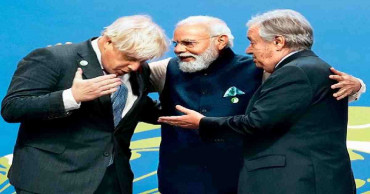Prime Minister Narendra Modi
What's the significance of Ram Mandir in Ayodhya?
About 80 chartered flights have landed at the new international airport of India's holy city of Ayodhya for Monday’s partial opening of the controversial grand temple for one of Hinduism’s most revered deities, Lord Ram.
Ayodhya’s airport can barely accommodate the influx of private jets. “The planes will depart after dropping guests,” airport manager Saurabh Singh said.
The temple was built over an ancient razed mosque, and most political opposition leaders are boycotting the temple's opening, saying it doesn't befit a secular India.
However, the list of attendees boasts some of India's most influential people: Prime Minister Narendra Modi, industrialists Mukesh Ambani and Gautam Adani and Bollywood superstar Amitabh Bachchan.
Ahead of the upcoming general election, Modi’s Hindu nationalist party is using the elaborate consecration ceremony to lobby the country's Hindu majority.
Read more: Ancient Temples of Bangladesh: Remembering Their Past Glory
THE LEGEND OF RAM, THE PRINCE OF AYODHYA
The temple will be the sacred abode of one of the Hindu pantheon's most popular gods Ram, who Hindus believe was born at the exact site in Ayodhya.
Millions of Hindus worship Lord Ram with an intense belief that chanting his name in times of adversity will bring peace and prosperity, and most of those who practice Hinduism keep idols of Ram in their homes. Major Hindu festivals like Dussehra and Diwali are associated with mythological tales of Ram extolling the virtues of truth, sacrifice and ethical governance.
The mythological Hindu epic “Ramayan," which tells the story of Ram’s journey from prince to king, has often been adapted in popular culture. One of the most-viewed fabled shows is the TV series “Ramayan” created in the 1980s which continues to have a faithful audience.
Ram’s divinity is not only the dominant religious force in India but also part of the ancient cultural heritage in countries like Thailand, Indonesia, Myanmar and Malaysia.
Read more: A Hindu temple built atop a razed mosque in India is helping Modi boost his political standing
A TEMPLE RISES
Spread over nearly 3 hectares, the temple — which is still being built— has an estimated cost of $217 million. It's made with pink sandstone, adorned with intricate carvings, and has 46 doors — 42 of which will have a layer of gold.
Anil Mishra, a member of the trust overseeing the construction, said the temple blends traditional design with cutting-edge technology and is “crafted without the use of iron, steel, or cement."
A 1.3-meter (4.25-foot) dark stone sculpture depicting Ram was installed in the temple’s inner sanctum for Monday’s consecration. The religious ritual of “Pran Pratishtha," which signifies giving life to the idol, will be conducted according to Hindu Vedic scriptures. The deity can then receive and bless devotees.
After the ceremony, the temple will open to the public and an estimated 100,000 devotees are likely to visit daily, authorities say.
AYODHYA, PAST AND PRESENT
The city known for its narrow lanes crowded with Hindu pilgrims and shops selling miniature Ram idols, has been given a facelift with modern infrastructure and services. Ayodhya’s modest airstrip has grown into an expansive international airport with a 2.2-kilometer (about 1.4-mile) runway in the first phase. The clean railway station has a daily passenger capacity of about 50,000 people.
“The historical and spiritual significance of Ayodhya makes it a compelling destination,” and a huge surge in demand is anticipated, said Ravi Singh, a representative of the Indian Hotels Company Limited.
THE CONTROVERSY
Ayodhya has been at the center of India’s turbulent politics and the Hindu majoritarian quest to redeem the country’s religious past for decades. Its diverse, multicultural past was overrun by strident Hindu nationalism after mobs demolished the 16th-century Babri mosque in 1992.
Hindus won a prolonged legal battle in 2019, allowing them to build the temple. Hindus make up about 80% of India’s population but the country is also home to some 200 million Muslims who have frequently come under attack by Hindu nationalists.
Modi has been the face of an unprecedented, and unapologetic, fusion of religion and politics in India and led the temple’s groundbreaking ceremony in 2020.
Critics say the idea of a diverse, constitutionally secular state leading a Hindu religious ritual is deplorable. Most opposition leaders have declined the invitation, saying the event is being used for political campaigning by Modi's Bharatiya Janata Party (BJP) which promised to build a Ram temple as part of its election strategy.
Modi has asked people to publicly celebrate the consecration by lighting lamps at homes and temples. The message is clear: Mobilization of Hindu voters will be a key issue in the upcoming national election as Modi looks to extend his rule for a record third-consecutive term.
Read more: India's Modi is set to open a controversial temple in Ayodhya in a grand event months before polls
2 years ago
India to raise spending on job creation ahead of election
Indian Prime Minister Narendra Modi’s government presented to Parliament on Wednesday an annual budget of $550 billion that calls for ramping up capital spending by 33% to spur economic growth and create jobs ahead of a general election next year.
Finance Minister Nirmala Sitharaman said private investment was rising after the pandemic and the government should focus on driving growth.
India’s economy is projected to grow 7% in the fiscal year ending in March. The government forecasts growth of 6%-6.5% next year.
The country's population is expected to overtake China's in size this year, and its economy last year surpassed that of the United Kingdom to become the world's fifth largest.
But despite steady economic growth, the Modi government has struggled to quash unemployment concerns and is under pressure to generate enough jobs, especially as it faces key state polls this year and a general election in 2024, which it is favored to win.
“The budget makes the need once again to ramp up the virtuous cycle of investment and job creation,” Sitharaman said.
According to the Center for Monitoring Indian Economy, the unemployment rate stood at 8.3% in December, up from 6.5% in January 2022.
The government is aiming for a budget deficit of 5.9% of India's gross domestic product for the 2023-24 financial year, lower than the 6.4% for this fiscal year.
Despite worries that the world economy is headed for a slump, the finance minister she was confident the country's future was bright. “India is on the right track,” she said.
Read more: India raises interest rate to 5.4%, in 3rd hike since May
Apart from raising capital spending on construction of schools, airports, heliports and other infrastructure to $122 billion, the budget extended a $24 billion scheme to provide free grains to vulnerable households for one year.
The government will also increase by 66% its spending on providing affordable housing to the urban poor, Sitharaman said, and prioritize “green growth” with a $4.3 billion investment towards helping India meet its goal of going carbon neutral by 2070.
The budget also announced new tax relief measures aimed at bringing some respite for India's large middle class. But it slashed spending by 30% on India's rural jobs program, a boon for the country's most vulnerable, triggering criticism from activists and the opposition.
On Wednesday, Modi praised the budget as laying a strong “foundation for the aspirations and resolutions of a developed India," and said the government's investment into infrastructure has increased by more than 400% since 2014 when he first became prime minister.
Sitharaman's budget speech was briefly interrupted by opposition lawmakers chanting “Adani, Adani,” after a tussle between Indian billionaire Gautam Adani and a U.S.-based short-seller dominated headlines this week.
Political opponents have urged India's market regulator to investigate Adani after the short-selling firm accused his conglomerate of stock market manipulation and accounting fraud. The allegations led investors to dump Adani-related shares, wiping out tens of billions of dollars worth of market value for his business empire.
Critics of the 60-year-old billionaire say his rise has been boosted by his apparent close ties to Modi. The Adani Group has denied the allegations.
The budget requires approval from both houses of Parliament, but it is bound to be enacted as Modi's party holds a strong majority.
3 years ago
Modi govt's Muslim face Mukhtar quits as Minister
Prime Minister Narendra Modi-led Bharatiya Janata Party (BJP) government's prominent Muslim face Mukhtar Abbas Naqvi resigned as India's Minority Affairs Minister on Wednesday.
The 64-year-old's sudden resignation comes a day before his term as a member of Rajya Sabha (Upper House of Parliament) ends, triggering speculation that he may run for the Vice-President of India.
Read: India’s Nupur Sharma battle reaches the judiciary
Earlier in the day, Naqvi met with Prime Minister Modi and BJP president JP Nadda."He has handed over his resignation to Modi after the meeting," sources told UNB.
Naqvi began his political career as a student leader and was jailed during the Emergency. He served as junior Information and Broadcasting Minister in former Prime Minister Atal Bihari Vajpayee's government in the late 1990s.
Read: In Kashmir, ‘conscious music’ tests India’s limits on speech
Incumbent Vice-President M Venkaiah Naidu's five-year term ends on August 10. The elections are slated for August 6.
3 years ago
Indian Prez, PM greet people on Eid
Indian President Ram Nath Kovind and Prime Minister Narendra Modi have greeted people on the occasion of Eid-ul-Fitr.
"On the occasion of Eid-ul-Fitr, I extend my best wishes and greetings to all the fellow citizens, especially our Muslim brothers and sisters," the President said in his message.
"On the auspicious occasion of Eid, let us resolve to rededicate ourselves to the service of humanity and to improve the lives of the poor and needy," he added.
Modi, who's currently on a three-nation tour of Europe, also took to Twitter to convey his greetings to citizens on Eid.
Also Read: Indian PM gets second dose of Covid vaccine
"Best wishes on Eid-ul-Fitr. May this auspicious occasion enhance the spirit of togetherness and brotherhood in our society. May everyone be blessed with good health and prosperity,” the PM tweeted.
Though Hindus make up nearly 80% of India's 1.30 billion population, Muslims comprise roughly 15%.
3 years ago
British PM arrives in India
British Premier Boris Johnson on Thursday arrived in Prime Minister Narendra Modi's home state of Gujarat on a two-day India visit, a tour expected to give fresh impetus to the proposed bilateral free-trade agreement.
"It’s fantastic to be in India, the world’s largest democracy," Johnson tweeted after his flight landed at the international airport in the city of Ahmedabad this morning.
Also read: 10 killed in India road accident
"I see vast possibilities for what our great nations can achieve together. Our powerhouse partnership is delivering jobs, growth and opportunity. I look forward to strengthening this partnership in the coming days," he wrote.
From the airport, the British PM went to Mahatma Gandhi's Sabarmati Ashram in Ahmedabad and tried his hand at spinning the charkha.
"It is an immense privilege to come to the Ashram of this extraordinary man, and to understand how he mobilised such simple principles of truth and non-violence to change the world for the better," he wrote in the visitor's book at the ashram.
On Friday, Johnson is slated to meet PM Modi in Delhi where both the leaders are expected to discuss trade, defence and Indo-Pacific, among other issues.
Also read: 14 arrested after communal violence in Indian capital
Speaking to reporters on the plane on his way to India, the British PM said, "I have always been in favour of talented people coming to this country."
"We are short to the tune of hundreds of thousands of people in our economy and we need to have a progressive approach and we will," he added.
3 years ago
Protest in India's capital on 2nd day of nationwide strike
Hundreds of workers marched with the red flags of the labor unions and chanted anti-government slogans in India’s capital on Tuesday as part of a two-day nationwide strike that began Monday.
The demonstration was held at Jantar Mantar, an area of New Delhi close to Parliament that is often used for protests. Protesters said economic policies under Prime Minister Narendra Modi’s government were hurting workers and the country's vast unorganized sector.
“Modi government has only one point, that it wants to hide its economic criminality under the garb of communalism and religion,” said Swadesh Dev Roye, a top official with the Centre of Indian Trade Unions.
Read: Indian LOC: Fund disbursement nearly doubles in one year
About a dozen labor unions that organized the strike want the government to provide universal social security coverage for workers in the vast unorganized sector, hike the minimum wage under a flagship employment guarantee program and scrap a new labor law that gives employers greater leeway in setting wages and working hours. The demonstrators included contract health workers who wore protective robes and demanded increased wages and regulation of their services.
Strikers are also demanding that the government halt plans of privatization of some public-sector banks and the sale of public assets.
Modi’s government says privatizing some state-owned banks would overhaul the banking industry and that asset sales would help raise money to spur economic growth.
The two-day strike was felt nationwide, and essential services related to banking, transportation, railways and electricity were impacted in several states.
Read:After 2 years, India resumes int'l flights
Elsewhere in the country, protests were held in eastern West Bengal state where demonstrators stopped trains at several locations. In southern Kerala, where the state government led by the opposition Communist Party of India backed the protest, streets were empty and shops shuttered.
India’s economy has bounced back after experiencing a major blow during the first two years of the pandemic. But many jobs have disappeared, with unemployment rising to 8% in December.
3 years ago
Modi's BJP all set to retain India's largest state of Uttar Pradesh
Prime Minister Narendra Modi's ruling Bharatiya Janata Party (BJP) is all set to retain India's largest state of Uttar Pradesh, seen as the gateway to power in the 2024 general elections. This inference can be drawn from early trends showing the saffron outfit, led by monk-turned-politician Yogi Adityanath, is way ahead of the state's main opposition Samajwadi Party led by its young leader and former chief minister Akhilesh Yadav.
Read: Modi welcomes Russia’s talks with Ukraine on ceasefire: MEA
In fact, the trends indicate that the BJP has comfortably taken a lead in over 220 seats in the 403-member assembly. On the other hand, the Samajwadi Party is trailing in double digits. The final results will be out later in the day.
Uttar Pradesh voted in seven phases --February 10, 14, 20, 23, 27, March 3 and 7 -- adhering to all Covid-safety protocols.
While the opposition parties harped on issues like rising joblessness, high inflation and the BJP's Hindu majority politics, the BJP highlighted law-and-order problems during the Samajwadi Party rule.
Uttar Pradesh is crucial for the BJP as it's said that the road to Delhi passes through Lucknow, its capital, and the party that wins the state stands a fair chance of forming the next federal government.
Read: Mamata, Modi on the same page on Ukraine crisis
Moreover, a win in Uttar Pradesh will be a major boost for the Prime Minister halfway through his second term in power. The general elections are due in India in 2024.
3 years ago
India's first military chief among 13 dead in chopper crash
India's first military chief General Bipin Rawat, his wife and 11 other armed forces personnel were killed in a chopper crash in the southern state of Tamil Nadu on Wednesday.
The 63-year-old decorated Chief of Defence Staff (CDS) was on his way to deliver a lecture at the Defence Services Staff College in Wellington when the ill-fated Mi-17 V5 helicopter crashed just before landing around 11.45am in the hilly terrain of the Nilgiris in the state's Coonoor district and burst into flames.
A senior Air Force officer accompanying the four-star General survived the fatal crash but sustained severe burn injuries. He has been identified as Group Capt Varun Singh, who is currently under treatment at the Military Hospital in Wellington.
Read: India's military chief feared dead in chopper crash
4 years ago
India's Omicron cases rise to 21
India's Omicron cases have risen to 21, with as many as 17 people testing positive for this new variant of Covid across the country in 24 hours, officials said Monday.
This is a sharp spike of 19 cases of the Omicron variant in just four days, despite the country ramping up efforts to contain its spead. India Thursday reported its first two known Omicron variant cases, discovered in two men in Karnataka state.
"In 24 hours till Sunday night, nine people in the northwestern Indian city of Jaipur, seven in the western city of Pune and a 37-year-old fully vaccinated man who arrived in the national capital from Tanzania tested positive for the new variant," an official said.
Read:India reports first two Covid cases of Omicron variant
Omicron has been classified as "a variant of concern" by the World Health Organisation. It was first discovered in South Africa.
Meanwhile, on Monday, India logged a total of 8,306 new Covid cases in 24 hours, taking the total caseload to 3,46,41,561, according to the latest Health Ministry data.
Last week, the Indian government backtracked on its decision to resume regular international flights from December 15, following an advice from Prime Minister Narendra Modi.
The Indian government put curbs on all domestic and international flights in March last year in the wake of the Covid-induced lockdown. However, it allowed domestic flights from May 2020, and the entry of all foreigners except tourists from October that year.
4 years ago
COP26: India will reach net zero emissions by 2070, says PM Modi
Prime Minister Narendra Modi on Monday gave a five-pronged target for India and finally committed to a Net Zero emission target by 2070, joining the likes of the US, the UK and China, reports Business Standard.
“I am giving a panchamrit — five targets that India is committing to join the global fight for climate change — by 2030. Our non-fossil capacity will touch 500 Gw and 50 per cent of our energy needs will come from renewable energy sources. From now to 2030, the projected carbon emissions will reduce by 1 billion tonnes and our overall carbon intensity of the economy will see a 45 per cent reduction.”
In line with expectations from the UK and the US, he said India would be a Net Zero economy by 2070.
Net Zero is achieved when the amount of greenhouse gas produced is offset by the amount removed from the atmosphere. This entails no future investment in coal or fossil fuels and greening several industries and economies.
Read:How virtual galleries kept Indian art alive amid Covid
Modi also upped the renewable energy target of the country to 500 Gw by 2030. It was 450 Gw earlier. India’s current RE capacity stands at 175 Gw.
“Today India’s installed renewable capacity is fourth in the world. In the last seven years, our non-fossil fuel energy has seen 25 per cent growth and the share of green energy in the mix reached 40 per cent,” Modi said, adding that India’s national transporter, Indian Railways, had declared a Net Zero target year of 2030.
“This entails 60 million tonnes of emission reduction every year. Another 40 million tonne emissions reduction will come from our LED programme,” Modi said.
He spoke of several other initiatives of India, including the International Solar Alliance (ISA), and said India had joined the Coalition for Disaster Resilient Infrastructure.
He asked the developed world to increase financing to meet the enhanced targets that India had declared.
“India has raised its ambition in setting its targets. They also need to raise ambitions in climate finance and tech transfer. The world cannot achieve newer targets with old goals of climate finance,” Modi said.
India is the only country to fulfil commitments made in Paris. India is putting climate change at the centre of its policies, Modi said.
"Whole world thinks is only one economy which has worked Paris agreement on letter and spirit and it is India," said the PM.
The US has declared Net zero by 2050, same as the UK. China has net zero target year 2060.
India has been long pressed by global leaders to declare a net zero target. From the US, John Kerry, special Presidential envoy for climate change, has long pressed India to declare a headline ‘Net Zero’ target. On his last visit to India, Kerry termed India a “red-hot investment destination” for the solar sector, saying the country has set an example for developing nations by reaching 100 Gw of renewable energy capacity.
Read: US returns antiquities to India in stolen art investigation
Speaking at the same event, Joe Biden, the US President said his government has proposed to quadruple the climate financing by the US by 2024 for adaptation efforts. He said the country will try to meet the $100 billion annual financing target of developed world to developing countries.
A day before, Bhupendra Yadav, union Minister for Environment, Forest and Climate Change, said developed countries have not only failed to meet the $100 billion goal per year of support to developing countries.
Delivering the statement on behalf of the BASIC group of countries, comprising Brazil, South Africa, India and China at the UN Climate Change Conference underway at Glasgow, Yadav said, "In a context where developing countries, including BASIC countries, have massively stepped up their climate actions since 2009, it is unacceptable that there is still no matching ambition from developed countries on the enabling means of implementation on climate finance support."
4 years ago















